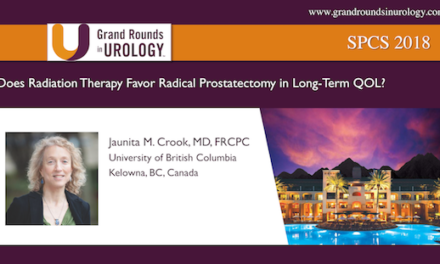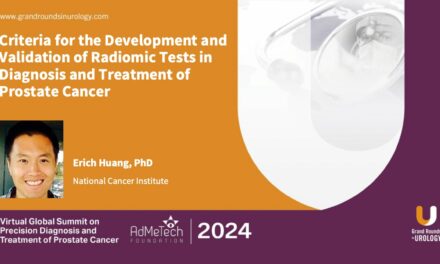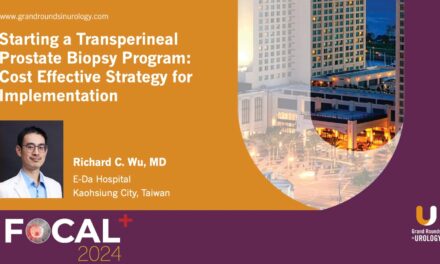Mira Keyes, MD, FRCPC, presented “Brachytherapy: The Royal Flush of Radiation Treatment for Men with High-Risk Prostate Cancer” during the 32nd Annual International Prostate Cancer Update (IPCU32) conference on March 8, 2022, in Snowbird, Utah.
How to cite: Keyes, Mira. “Brachytherapy: The Royal Flush of Radiation Treatment for Men with High-Risk Prostate Cancer” March 8, 2022. Accessed Dec 2025. https://grandroundsinurology.com/brachytherapy-the-royal-flush-of-radiation-treatment-for-men-with-high-risk-prostate-cancer/
Brachytherapy: The Royal Flush of Radiation Treatment for Men with High-Risk Prostate Cancer – Summary
Mira Keyes, MD, FRCPC, a Clinical Professor at the University of British Columbia (UBC) and a radiation oncologist at the Vancouver Centre of the British Columbia Cancer Agency (BCCA), discusses the benefits of prostate brachytherapy (PB) for men with high- and very high-risk prostate cancer, explaining that it has excellent long-term outcomes (with the best cure rates of all radiation therapy [RT] treatments), requires less androgen deprivation therapy (ADT), has less downstream toxicity and lower cost than alternatives. She cites American Society of Clinical Oncology (ASCO), Cancer Care Ontario (CCO), and National Comprehensive Cancer Network (NCCN) guidelines before discussing how a shift from volume- to value-based care can drive accountable care with brachytherapy. Dr. Keyes explains reasons for the decrease in the use of PB in the United States and highlights funding issues, including the fact that intensity-modulated radiation therapy (IMRT) is more profitable than PB in the U.S. by more than tenfold. She contrasts this “profit medicine” model with trends in Canada and Europe, where PB use has increased. Dr. Keyes then justifies the use of PB, highlighting the fact that inadequate radiation or a geographic “miss” within the prostate results in failure to cure localized cancers. She explains that when PB is combined as a “boost” with external beam radiation therapy (EBRT), it is able to deliver an adequate dose and avoid the geographic “miss,” covering microscopic disease. Dr. Keyes cites data linking local failure to worse patient overall survival (OS) before citing three trials that show better long-term outcomes for patients who receive EBRT with PB boost than those who receive EBRT alone. In fact, in these trials, recurrence-free survival (RFS) increased by 25-30 percent. Further, additional trials showed this treatment led to better prostate cancer-specific mortality (PCSM) by an absolute difference of 30-40 percent. Dr. Keyes explains that national data being collected in both the U.S. and Sweden bear these results out, before she turns to ADT, concluding that across 52 studies of over 43,000 patients, there was no OS benefit to adding ADT to EBRT and PB for any risk groups. She addresses toxicity and explains that modern PB has very low toxicity and excellent prostate-specific antigen (PSA) control with PB boost prevents significant downstream toxicity. Dr. Keyes concludes by addressing cost, sharing data and concluding that using PB boost costs, on average, ~50,000 less than IMRT; she attributes much of this savings to decreased downstream costs.
About the 32nd Annual International Prostate Cancer Update (IPCU32):
Presented by Program Chair E. David Crawford, MD, The International Prostate Cancer Update (IPCU), is a multi-day, CME-accredited conference focused on new developments in prostate cancer treatment, diagnosis, and prevention. IPCU 32 featured lectures, interactive discussions, panel roundtables, debates, and case reports. This conference was led by expert physicians and is designed for urologists, medical oncologists, radiation oncologists, and other healthcare professionals involved in the diagnosis and treatment of prostate cancer.
ABOUT THE AUTHOR
Mira Keyes, MD, FRCPC, FABS, is a Clinical Professor of Radiation Oncology in the Division of Surgery at the University of British Columbia in Vancouver, Canada. Dr. Keyes' research interests include prostate brachytherapy, genitourinary oncology, and breast cancer.





